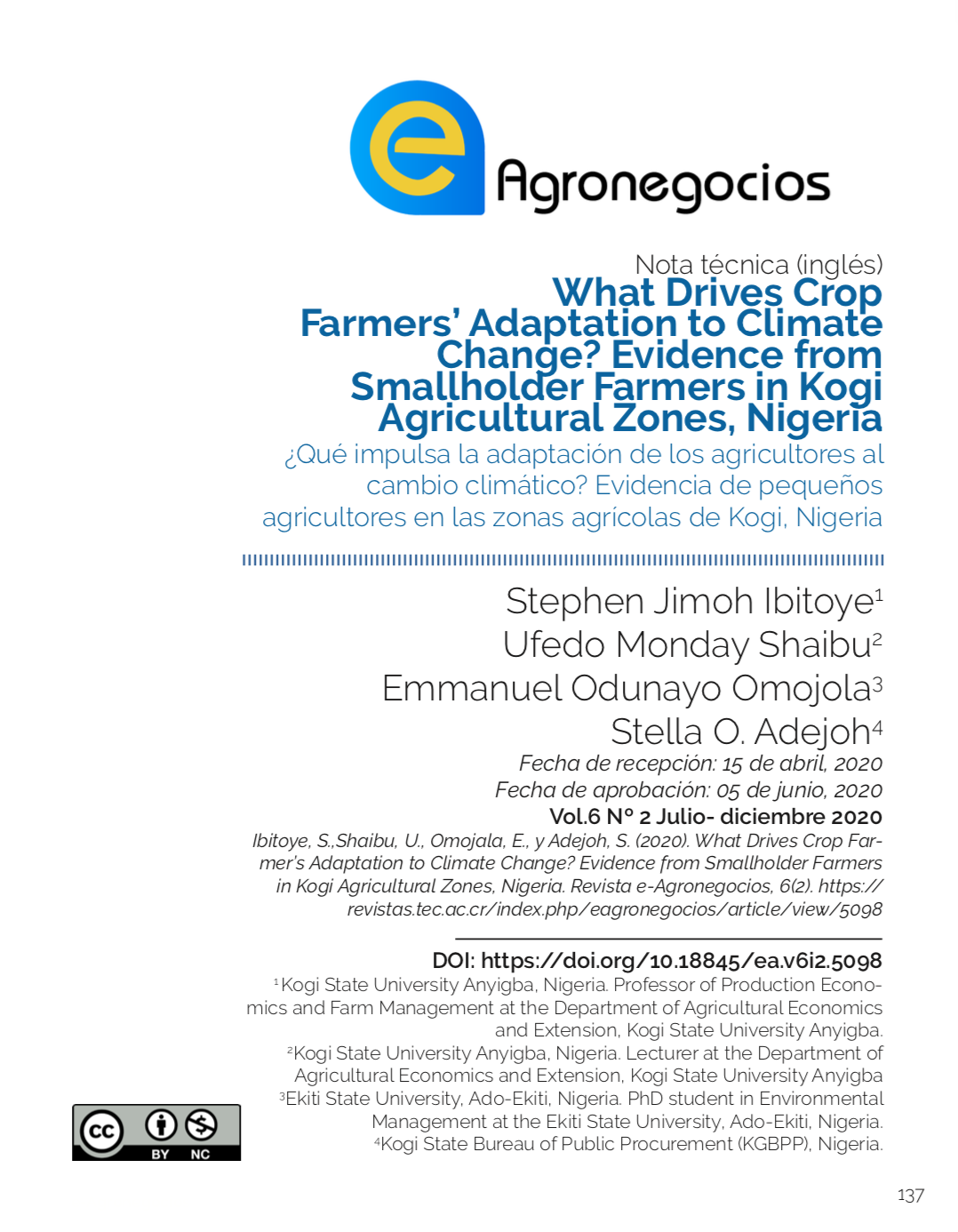What Drives Crop Farmers’ Adaptation to Climate Change Evidence from Smallholder Farmers in Kogi Agricultural Zones, Nigeria
Main Article Content
Abstract
Prevailing scenarios in Kogi agricultural zones of Nigeria, such as; the environment becoming hotter and drier, rainy seasons getting unpredictable and increasingly erratic and different variations are clear evidence of climate change which alternate cropping date or duration, and has grown to become a major concern for sustainable agricultural production. This study determined factors that drive crop farmers’ adaptation to climate change in Kogi Agricultural Zones, Nigeria using a randomly selected one hundred and fifty (150) farmers as respondents. Relevant primary data obtained through questionnaire administration in March – June 2018 were analyzed using descriptive and inferential statistical tools. The Tobit regression model was used to determine the drivers of adaptation to climate change. The socioeconomic characteristics of the sampled respondents showed that 78.67% were males with a mean age of 40 years. The result further showed that majority of the farmers were aware of the effect of climate change (sigma score = 5.714) with respect to the following items: hot environment (sigma score = 5.300), irregular rainfall (sigma score = 5.300), and yield reduction (sigma score = 5.082). The Tobit regression result indicated that age (β = 0.028), household size (β = -0.072), membership of cooperative society (β = 0.439) and number of extension contacts (β = 0.026) were significant factors that drive smallholder crop farmers’ adaptation to climate change. For informed policy decisions; the government and other relevant stakeholders should encourage farmers to join agricultural cooperative societies and also continue to support the extension service delivery system to increase farmers’ adaptation capacities.
Article Details

This work is licensed under a Creative Commons Attribution-NonCommercial 4.0 International License.
Las personas autoras conservan los derechos de autor/a y ceden a la revista el derecho de la primera publicación y que pueda editarlo, reproducirlo, distribuirlo, exhibirlo y comunicarlo en el país y en el extranjero mediante medios impresos y electrónicos. Asimismo, las personas autoras asumen el compromiso sobre cualquier litigio o reclamación relacionada con derechos de propiedad intelectual, exonerando de responsabilidad a la Editorial Tecnológica de Costa Rica. Además, se establece que los autores pueden realizar otros acuerdos contractuales independientes y adicionales para la distribución no exclusiva de la versión del artículo publicado en esta revista (p. ej., incluirlo en un repositorio institucional o publicarlo en un libro) siempre que indiquen claramente que el trabajo se publicó por primera vez en esta revista.
References
Apata T. G. Samuel, K. D. and Adeola, A. O. (2009). Analysis of Climate change perception and Adaptation among Arable Food Crop Farmers in south Western Nigeria. Paper presented at the conference of International Association of Agricultural Economics pp. 2-9.
Asrat, P and Simane, B (2018). Adapting small holder agriculture to climate change through sustainable land management practices: empirical evidence from north west Ethiopia. Journal of agric science technology. 7:289-301.https://doi.org/10.17265/2161-6256/2017.05.001
Bamire, A.S., Fabiyi, Y.L., and Manyong, V.M. (2002). Adoption pattern of fertilizer technology among farmer’s in the ecological zones of Southwestern Nigeria: Tobit analysis. Austr. J. Agric. Res. 59:901-910
Christopher, E.T., Orach-Meza1, F. L. and Eric L. E. (2015). Understanding Small-Scale Farmers’ Perception and Adaption Strategies to Climate Change Impacts: Evidence from Two Agro-Ecological Zones Bordering National Parks of Uganda School of Sciences, Nkumba University, UgandaAfrican Wildlife Foundation (AWF), Kampala, Uganda
Deressa, T., Hassan, R.M.,Alemu, T.,Yesuf, M. and Ringler, C. (2010). Analyzing the Determinants of Farmers’ Choice of Adaptation Methods and Perceptions of ClimateChange in the Nile Basin of Ethiopia.
International Food Policy Research Institute (IFPRI)Discussion Paper No. 00798. Environment and Production Technology Division, IFPRI,Washington D.C
Füssel, H-M., and R.J.T. Klein. (2016). Climate Change Vulnerability Assessments: An Evolution of Conceptual Thinking. Climate Change 75: 301-329.
Gehendra, B.G and Dinanath, B. (2008). An Integrated Approach to Climate Change Adaptation. Leisa Magazine on how external input and Sustainable Agriculture, 24(4):6
Idrisa, Y. L., Ogunbameru, B. O., Ibrahim, A. A. and Bawa, D. B. (2012). Analysis ofawareness and adaptation to climate change among farmers in the Sahel Savannahagro-ecological zone of Borno State, Nigeria. British Journal of Environment and Climate Change, 2(2), 216 – 226.
Ikhile, C.I. (2007). Impacts of climate variability and change on the hydrology and water resources of the Benin-Owena River Basin. PhD dissertation, University of Benin, Benin City, Nigeria.
Odjugo, P.A.O (2009). Quantifying the cost of climate change impact in Nigeria: Emphasis on wind and rainstorms. J. Hum. Ecol. 28(2):93- 101
Okoye, I.G, Okorji, J.A, and Asumugha D.C, (2014). Climate change, agriculture and food security: Implications for the tropical region. Nigerian Meteorological Society Proceedings on the International Conference on Climate Change and Sustainable Development held at Oshogbo, Nigeria, December, 6-11, 2004, pp. 6-10.
Oyekale, A.S. (2009). Climatic Variability and its impact on Agricultural Income and Households Welfare in Southern and Northern Nigeria. Electronic journal of Environmental, Agricultural and food Chemistry. ISSN:15794377.
Selvaraju,R., Subbiah, A.R. Baas, S. and Juergens, I. (2006). Livelihood adaptation to climate variability and change in drought-prone areas of Bangladesh. Case Study Project Under Institution For Rural Development, Pp. 1-76.
Shaibu, U.M., Ibitoye, S.J. and Ibrahim, M.K. (2016). Impact of Nigeria Agricultural Insurance Scheme (NAIS) on Farmers’ Welfare in Kogi State, Nigeria. NSUK Journal of science and Technology 6(1): 64 – 69
Shaibu, U.M., Ibitoye, S.J., Oyibo, F.O., Emeje, C.A. and Omojola, D. (2020). Assessment of Crop Farmers’ Willingness To Take (WTT) Agricultural Insurance Scheme in Kogi State, Nigeria: Application of Turnbull Estimator. Revista E-Agronegocios, 6(1). https: DOI: https://doi.org/10.18845/rea.v6i1.4937
Smarden, R. S. (2011). Farmers’ Perception of Risk, Impacts and Adaptation to Climate Change. Perspectives from Western India Dinesh: College of Environmental Science and Forestry.
Sofoluwe, N. A., Tijani, A. A. andBaruwa, O. I. (2011). Farmers’ perception and adaptation toclimate change in Osun State, Nigeria. African Journal of Agricultural Research,6(20), 4789-4794. Available online at http://www.academicjournals.org/AJAR. DOI:10.5897/AJAR10.935. Retrieved on 5th November, 2019
Udenyi O.G, (2010). Impacts of Climate Change. Nigeria Social Network

